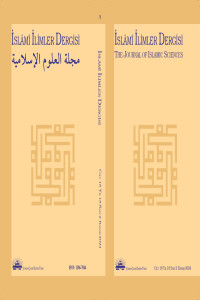Abstract
It is known that the Qurʾan was revealed in an oral form in relation to different events that took place in a certain period of time. The Mushaf emerged when the chapters of revelation, which the Prophet conveyed to the first interlocutors of the Qurʾan as a living dialog, were transformed into written form by observing a certain structural and stylistic standard during the caliphate period. While the Qurʾānic passages in the form of shifāhī had all the necessary aspects to be understood during the period of revelation, they were deprived of their external context when they became Mushaf, or they were textualized by experiencing serious losses in this direction. In this respect, it can be stated that the need for exegesis in history stems from the deformation of the Qurʾanic content’s close relationship with history in the process of textualization. Therefore, an exegetical activity can be considered successful to the extent that it can eliminate this deformation.
Exegeting a Qurʾanic passage is equivalent to revealing its relationship with the history to which it belongs. In other words, understanding a Qurʾanic passage correctly is only possible by dating it correctly. In the tradition of exegesis, the studies on dating the Qurʾan were largely based on the integrity of the suras. The most important proof of this is the lists in the sources that are based on the order of the surahs. This assumption makes it difficult to date the verses in long suras that were revealed in relation to different events at different date intervals. In our opinion, it is not possible to make comprehensive evaluations about a part of the Qurʾan or the Qurʾan as a whole unless individual groups of verses in different parts of the Mushaf are identified and these verses are related to the historical contexts to which they belong.
This study will point out the shortcomings of tafsir studies that consider all suras as chapters with structural and thematic integrity and rely on the lists of the order of occurrence available in the sources to date them, and will include some determinations, suggestions and evaluations regarding the steps to be taken for the dating of individual verse groups.
References
- Apaydın, Mehmet. Hadislerin Tespitinde Bütünsel Yaklaşım. İstanbul: KURAMER Yay., 2018.
- Bâzergan, Mehdi. Kur’an’ın Nüzul Süreci. çev. Yasin Demirkıran, Muhammed Feyzullah. Ankara: Fecr Yay., 1998.
- Birışık, Abdulhamit. “Sûre”. TDV İslam Ansiklopedisi. Ankara: TDV Yay., 2009.
- Ebû Dâvûd, Suleymân b. el-Eşʿaŝ es-Sicistânî. Sunenu Ebî Dâvûd. nşr. ʿAdil Muḥammed, ʿAmmâr ʿAbbâs Kahire: Dâruʾt-Teʾṡîl, 2015.
- Fayda, Mustafa. “İfk Hadisesi”. TDV İslam Ansiklopedisi. Ankara: TDV Yay., 2000.
- Iṡfehânî, Ebûʾl-Ḳâsım el-Ḥuseyn b. Muḥammed er-Râğıb. el-Mufredât fî Ğarîbiʾl-Ḳurʾân. nşr. Ṡafvân ʿAdnân ed-Dâvûdî. Beyrut/Dımaşḳ: Dâruʾl-Ḳalem, ed-Dâruʿş-Şâmiyye, 1991.
- İbn Saʿd, Ebû ʿAbdullâh Muḥammed b. Saʿd b. Menîʿ. eṭ-Ṭabaḳât. nşr. ʿAlî Muḥammed ʿOmer. Kahire: Mektebetuʾl-Ḫancî, 2001.
- Ṭaberî, Ebû Caʿfer Muḥammed b. Cerîr b. Yezîd el-Âmilî. Câmiʿuʾl-Beyân ʿan Teʾvîli ʾÂyiʾl-Ḳurʾân. nşr. ʿAbdullâh b. ʿAbdilmuḥsin et-Turkî. Riyad: Dâru Hicr, 1422/2001.
- Özsoy, Ömer. Kur’an ve Tarihsellik Yazıları. Ankara: OTTO Yay., 2015.
Abstract
Kur’an’ın, belirli bir tarih aralığında vuku bulan birtakım hadiselerle ilişkili olarak şifâhî bir formda inzal edildiği bilinmektedir. Hz. Peygamber’in Kur’an’ın ilk muhataplarına canlı bir diyalog niteliğinde ilettiği vahiy bölümlerinin halifeler döneminde belirli bir yapısal ve biçimsel standart gözetilerek yazılı forma dönüşmesiyle Mushaf ortaya çıkmıştır. Şifâhî formdaki Kur’an bölümleri nüzul döneminde anlaşılabilmesi için gerekli yönleri haizken Mushaf hâline gelmesiyle dış bağlamından yoksun duruma gelmiş yahut bu yönde ciddi kayıplar yaşayarak metinleşmiştir. Bu yönüyle, tarihte tefsire ihtiyaç duyulmasını tetikleyen en önemli etkenlerden birinin Kur’an muhtevasının tarihle olan sıkı ilişkisinin metinleşme sürecinde uğradığı deformasyon olduğu ifade edilebilir. Bu yüzden bir tefsir faaliyetinin bu deformasyonu izale edebildiği ölçüde başarılı olduğu değerlendirilebilir.
Bir Kur’an bölümünü tefsir etmek onun ait olduğu tarihle ilişkisini ortaya çıkarmakla eş değerdir. Başka bir deyişle bir Kur’an bölümünü doğru anlamak ancak onu doğru tarihlendirmekle mümkündür. Tefsir geleneğinde Kur’an’ı tarihlendirme çalışmaları büyük ölçüde sûre bütünlüğü esas alınarak yapılmıştır. Kaynaklarda yer alan sûrelerin nüzul sıralamasını esas alan listeler bunun en önemli kanıtıdır. Bu kabul özellikle uzun sûrelerde yer alan farklı tarih aralıklarında farklı hadiselerle ilişkili nazil olan âyetlerin tarihlendirilmesini güçleştirmektedir. Kanaatimizce Mushaf’ın farklı bölümlerinde yer alan müstakil âyet grupları tespit edilip bunlar ait oldukları tarihî bağlamlara irca edilmedikçe Kur’an’ın bir parçası ya da bütünü hakkında kapsamlı değerlendirmeler yapmak imkân dâhilinde değildir.
Bu çalışmada tüm sûreleri yapısal ve tematik bütünlüğe sahip bölümler olarak kabul eden ve bunları tarihlendirmede kaynaklarda mevcut nüzul sıralaması listelerini esas alan tefsir araştırmalarının eksikliklerine işaret edilerek, müstakil âyet gruplarının tarihlendirilmesi için atılması gereken adımlara yönelik birtakım tespit, öneri ve değerlendirmelere yer verilecektir.
References
- Apaydın, Mehmet. Hadislerin Tespitinde Bütünsel Yaklaşım. İstanbul: KURAMER Yay., 2018.
- Bâzergan, Mehdi. Kur’an’ın Nüzul Süreci. çev. Yasin Demirkıran, Muhammed Feyzullah. Ankara: Fecr Yay., 1998.
- Birışık, Abdulhamit. “Sûre”. TDV İslam Ansiklopedisi. Ankara: TDV Yay., 2009.
- Ebû Dâvûd, Suleymân b. el-Eşʿaŝ es-Sicistânî. Sunenu Ebî Dâvûd. nşr. ʿAdil Muḥammed, ʿAmmâr ʿAbbâs Kahire: Dâruʾt-Teʾṡîl, 2015.
- Fayda, Mustafa. “İfk Hadisesi”. TDV İslam Ansiklopedisi. Ankara: TDV Yay., 2000.
- Iṡfehânî, Ebûʾl-Ḳâsım el-Ḥuseyn b. Muḥammed er-Râğıb. el-Mufredât fî Ğarîbiʾl-Ḳurʾân. nşr. Ṡafvân ʿAdnân ed-Dâvûdî. Beyrut/Dımaşḳ: Dâruʾl-Ḳalem, ed-Dâruʿş-Şâmiyye, 1991.
- İbn Saʿd, Ebû ʿAbdullâh Muḥammed b. Saʿd b. Menîʿ. eṭ-Ṭabaḳât. nşr. ʿAlî Muḥammed ʿOmer. Kahire: Mektebetuʾl-Ḫancî, 2001.
- Ṭaberî, Ebû Caʿfer Muḥammed b. Cerîr b. Yezîd el-Âmilî. Câmiʿuʾl-Beyân ʿan Teʾvîli ʾÂyiʾl-Ḳurʾân. nşr. ʿAbdullâh b. ʿAbdilmuḥsin et-Turkî. Riyad: Dâru Hicr, 1422/2001.
- Özsoy, Ömer. Kur’an ve Tarihsellik Yazıları. Ankara: OTTO Yay., 2015.
Details
| Primary Language | Turkish |
|---|---|
| Subjects | Tafsir |
| Journal Section | Articles |
| Authors | |
| Publication Date | March 9, 2024 |
| Submission Date | January 1, 2024 |
| Acceptance Date | February 25, 2024 |
| Published in Issue | Year 2024 Volume: 19 Issue: 1 |
Journal of Islamic Sciences is licensed under a Creative Commons Attribution-NonCommercial 4.0 International License (CC BY NC).


